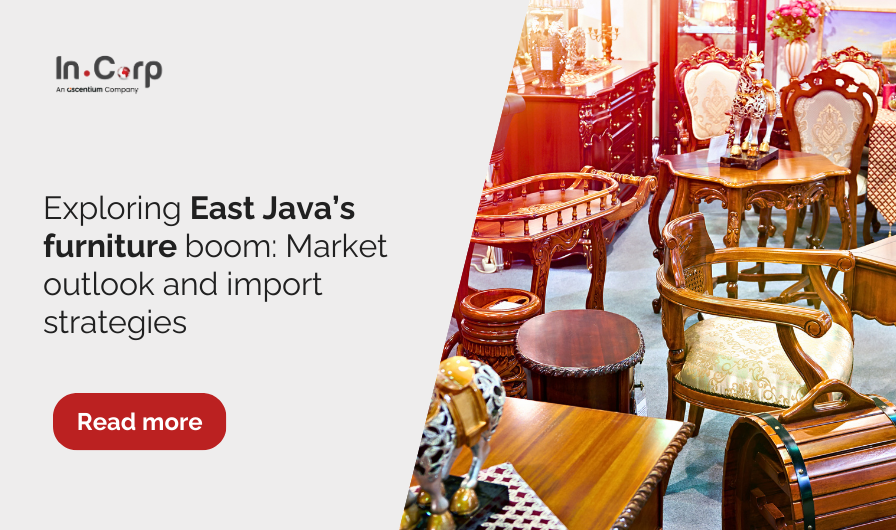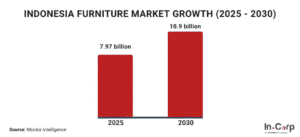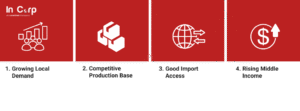Indonesia’s furniture business is growing fast. With cities like Surabaya and Jepara, East Java is a key player. Local designs, skilled craftsmanship, and global demand make this region a key player.
As cities grow and more people need stylish furniture, the market shifts. Modern trends blend with traditional techniques.
This article will explore the furniture business outlook and how to start importing furniture to Indonesia seamlessly for foreign enterprises.
Indonesia’s furniture market outlook
Indonesia’s furniture business is growing steadily. It’s expected to rise from USD 7.97 billion in 2025 to USD 10.90 billion by 2030, with an annual growth rate of 6.46%.
This growth is driven by rapid urban development and higher middle-class income. People are looking for modern, space-saving furniture that fits their lifestyles. With more disposable income and the rise of online shopping, demand for premium, stylish furniture is increasing.
Here are the top furniture business opportunities by segment:
- Home Furniture: The fastest-growing category for living room and bedroom items.
- Office Furniture: Boosted by remote work trends and the rise of coworking spaces.
- Online Retail: Gaining ground due to convenience, vast product selection, and digital innovations.
Read more: Indonesia’s top import-export business ideas
Why import furniture to East Java
East Java is a key player in Indonesia’s furniture industry. It is known for its skilled wood and rattan craftsmanship, especially from Jepara. As a major contributor to the national economy, East Java has become an attractive destination for global furniture brands and suppliers looking to enter or expand in the Indonesian market.
1. Growing Local Demand
Urban cities like Surabaya, Malang, and Gresik are expanding fast. Growing households and businesses mean steady demand for modern, practical furniture.
2. Competitive Production Base
Jepara and other areas in East Java already produce quality furniture. Imported items can complement local production by offering modern design and new materials.
3. Good Import Access
Surabaya’s port and logistics infrastructure make East Java an ideal import-entry point. Goods can efficiently reach domestic markets and be re-exported within ASEAN, reducing shipping costs and transit time.
4. Rising Middle Income
Household incomes in East Java have been growing steadily. This economic increase fuels a shift towards higher-quality and premium furniture, which imports are well-positioned to satisfy.
Importing furniture to East Java: Key Requirements
Importing furniture into East Java (or broader Indonesia) requires careful planning and compliance with national rules. Here’s a simplified guide:
1. Import Permit (NIB / API)
Your Indonesian legal entity or appointed Importer of Record (IOR) must obtain a Business Identification Number (NIB) via the OSS system, which acts as a general import license (API-U).
Without this permit, you cannot legally import goods. Alternatively, using an IOR allows foreign companies to import without a local license.
2. Pre-Approval & Restricted Goods
After obtaining an import permit, you must verify HS codes and compliance with the LARTAS list (restricted or banned items). You should also check if your furniture needs certifications like SVLK (for wood legality), halal, or tech permits.
3. Customs Clearance and Compliance
Proper customs clearance is essential to prevent shipment delays or rejections. To comply with Indonesian regulations, you must submit the following documents to the Directorate General of Customs and Excise:
- Import Declaration (PIB): This is the main customs form, submitted by the importer of record.
- Commercial Invoice: Lists the value and description of the goods.
- Packing List: Details item quantities, weights, and packaging.
- Bill of Lading / Air Waybill: Acts as the shipping contract between the sender and the carrier.
- Certificate of Origin: Confirms where the furniture was made.
- Insurance Policy: Shows the shipment is insured.
- Duty & Tax Payment Receipt: Proof that all required import taxes and duties have been paid.
4. Customs Duties & Taxes
Imported furniture typically incurs:
- Import Duty: 0–450% (based on HS code)
- VAT: 11%
- Income Tax: around 2.5%
- Luxury Tax: Applies only to selected luxury goods
Read more: Navigating the landscape of Indonesian imports
How InCorp Can Help
A valid import permit (NIB/API) is required for customs clearance to import furniture into East Java. Managing this process alone can be difficult and time-consuming.
InCorp Indonesia (an Ascentium Company) offers a complete Import Permit service to help your furniture business enter Indonesia quickly and compliantly.
What InCorp provides:
- Full support with NIB/API registration
- Step-by-step help with the OSS system and paperwork
- Ensuring full compliance with customs regulations
- Quick and legal entry into the Indonesian market
Ready to enter Indonesia’s furniture business? Contact us today and let us simplify your business journey into Indonesia.
Frequently Ask Questions
What is an import permit in Indonesia?
It’s an authorization linked to your Business Identification Number (NIB) from the OSS system, required to import goods legally.
Do I need an import permit for all goods?
Yes, for all imports. Restricted items like food, electronics, or chemicals also need additional licenses from relevant ministries.
What documents are needed to apply?
NIB, HS Codes, business licenses, tax ID, and product compliance certificates for restricted goods.
What are the risks of importing without a permit?
Your shipment may be delayed, seized, fined, or rejected by customs.
Get in touch with us.
What you'll get
A prompt response to your inquiry
Knowledge for doing business from local experts
Ongoing support for your business
Disclaimer
The information is provided by PT. Cekindo Business International (“InCorp Indonesia/ we”) for general purpose only and we make no representations or warranties of any kind.
We do not act as an authorized government or non-government provider for official documents and services, which is issued by the Government of the Republic of Indonesia or its appointed officials. We do not promote any official government document or services of the Government of the Republic of Indonesia, including but not limited to, business identifiers, health and welfare assistance programs and benefits, unclaimed tax rebate, electronic travel visa and authorization, passports in this website.





